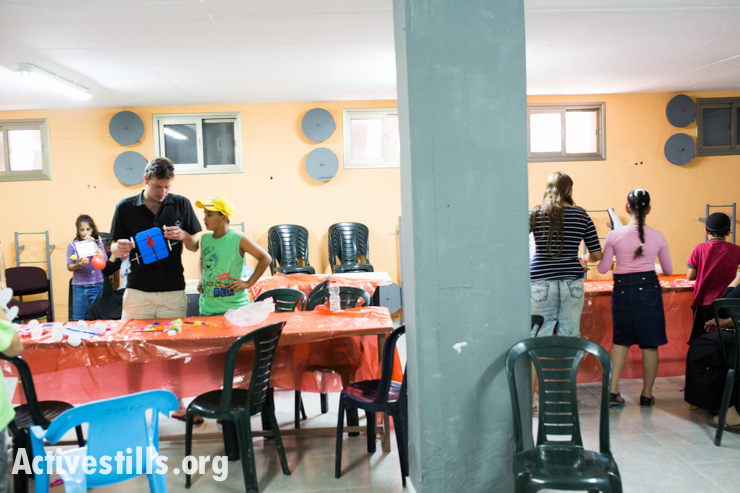Ever since the beginning of the war, jobs have evaporated in Be’er Sheva. Those who could afford to have left the city. And the worst part? The moment the rockets stop, the journalists and commentators will pack up their things and leave. Then what?
By Daniel Beller
I can’t stand seeing cynical politicians, those with easy access to a microphone or camera, speaking about the “strong home front” in Israel’s south. People have been living from siren to siren for more than a month, and earlier this week someone on the radio called for an end to the Home Front Command warnings, arguing that they ruin the smooth sequence between programs. In Be’er Sheva, people know that the minute the television crews leave the city, no one will care whether rockets are being fired at us. As long as they don’t fall in Tel Aviv, everything is cool.
Since the beginning of the fighting, the city has had difficulty returning to its normal self. There is no work. Be’er Sheva is based on a service and trade economy. Instead of establishing a major source of employment, the local leaders decided to set up service centers, jobs that outside of Israel are outsourced to the Third World, as well as malls and shopping centers.
When there is no money, the Be’er Sheva food chain collapses. Okay, not completely: there are those who have a permanent income, regardless of what happens outside. Others make do with what they can. The population continues to rise. The workers are transparent, cynically exploited, lack rights and must meet all their obligations all the time. The handyman, the private tutor, the graphic designer working from home, the teaching assistant, the gardener, the cleaner. Because of the situation, many of them now lack work.
Apart from some exceptions, cultural life in Be’er Sheva has all but come to a halt. That means that artists, mentors, actors, stage workers and tens of professionals are sitting at home. The city pinned its hopes on the summer as its festival season. Low-wage workers can barely take a week of military operations. This time, Israel is a month-deep into the fighting.
All the residents are asking for is to live a normal life. Security is not just Iron Dome and soldiers, but a way of living. It has been more than a month since people stopped being able to do the most basic things here, in accordance with the instructions of the Home Front Command. Those who can afford to will find somewhere else to go. You can see the roots of this phenomenon in the towns surrounding Gaza, where some residents have decided not to return. In a large city like Be’er Sheva, where the cost of living has long matched that of central Israel, people cannot survive without a promise of a just and decent mechanism to ensures their livelihood during war time. Without such a mechanism, some will be forced to find somewhere else to live.
It is very easy to speak of a united home front from inside a concrete bunker and with a guaranteed paycheck. It is more difficult to do so when there is nowhere to run, when rockets are falling and when you know that tomorrow you’ll have to pay the bills and go to the grocery store between sirens.
In light of this situation, how is it that the south does not rise up? People are afraid. Afraid about keeping the little livelihood they have – afraid that they may be seen as “leftists” or “unpatriotic.” It is this fear that causes them to prefer to take loans illegally rather than demand what they deserve.

“Be careful with what you write. They may break your hands. People today are violent, and someone like you is in danger,” said a friend who lives in central Israel. He used to live in Be’er Sheva, but grew tired of the “capital of the Negev.” “Forget journalism, it’s a dead profession. And anyway, you’re placing yourself in great danger. You will crash because there is no more tolerance. There is no democracy here. You should lower your profile and do something else. Sell your stupid house in Be’er Sheva and rent or buy a room in Tel Aviv.”
Yes, it is scary in Israel. But the periphery is even scarier, since one’s fear for personal security is compounded by a feeling of helplessness. The minute Israel’s television broadcasters fold their equipment and leave, we may be left with rockets and no livelihood. PR agencies, on the other hand, will continue to sell the story that there are opportunities in the Negev.
I’m not asking for endless opportunities, only two: to build a bomb shelter, and to be able to earn a decent living. I’ve already given up on quality of life and happiness. Since I am not rich enough or connected enough, a bomb shelter and a steady income will have to do. And I have no intention of leaving. This is my home, for better or for worse.
Daniel Beller is a journalist, blogger and radio broadcaster based in Be’er Sheva. Read this post in Hebrew on Local Call.
Related:
POEMS: After a night full of missiles in Gaza
Beyond protest: War and the Israeli Left


